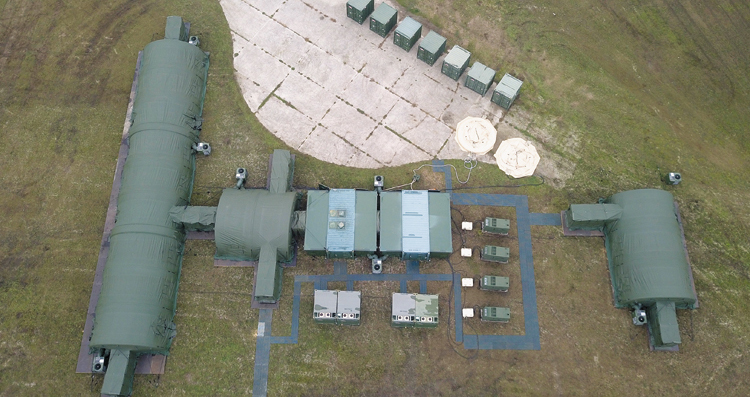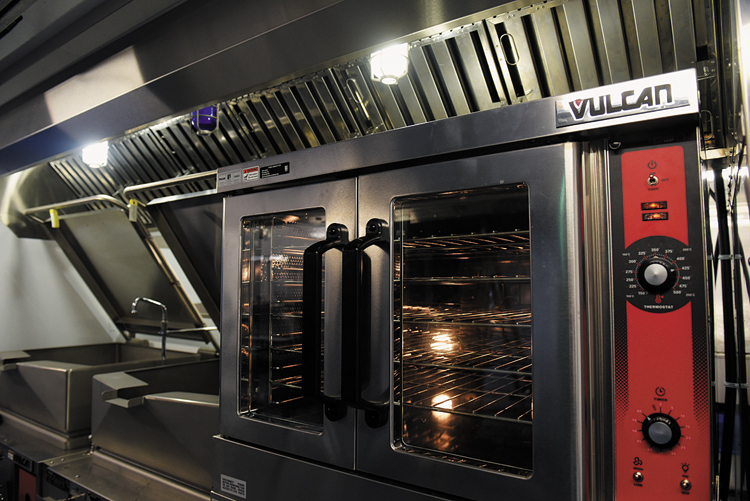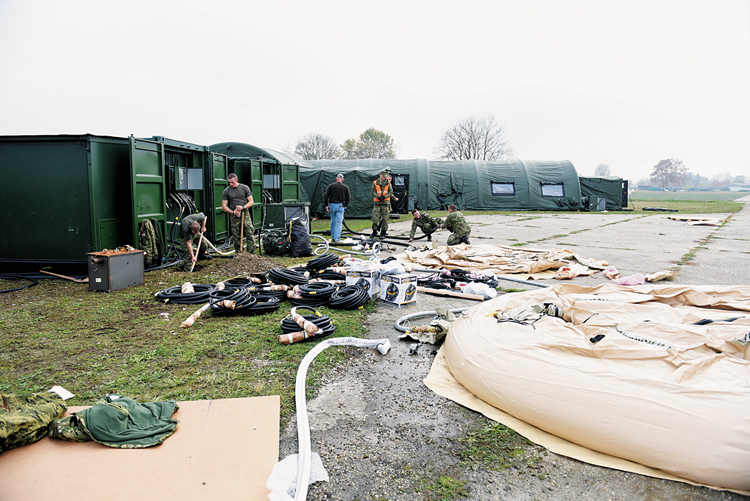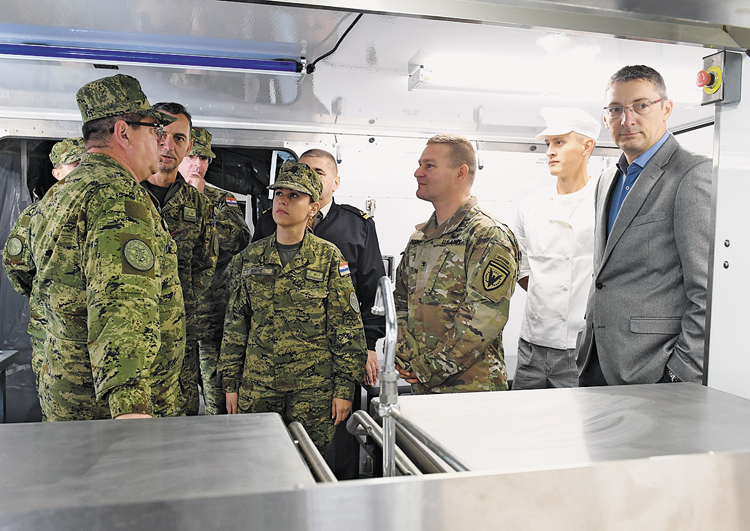The members of the Support Command are training to maintain a tent village which offers…
Expeditionary Camp’s New Kitchen Module
 CROMIL’s team visited the “1st Guards Brigade Tigrovi – Croatia” Barracks in mid-November. There, we encountered 18 members of the Service Company and two members of the Maintenance Company of the General Logistics Support Battalion, who were taking part on a two-week course aimed at learning how to use Force Provider All Electric Kitchen 600 PAX, a new kitchen module which will soon become a part of the Croatian Armed Forces’ expeditionary camp.
CROMIL’s team visited the “1st Guards Brigade Tigrovi – Croatia” Barracks in mid-November. There, we encountered 18 members of the Service Company and two members of the Maintenance Company of the General Logistics Support Battalion, who were taking part on a two-week course aimed at learning how to use Force Provider All Electric Kitchen 600 PAX, a new kitchen module which will soon become a part of the Croatian Armed Forces’ expeditionary camp.
 The new module, worth 1,315,000 USD, was donated by the United States of America through the Global Peace Operations Fund. Four lorries are needed to transport the entire system. Its basis is made up of two kitchen blocks equipped with state-of-the-art refrigerators, ovens, mixers, range-hoods and stainless-steel cookers. A meal for 600 people (or 1800 meals a day) can be prepared in the kitchen. That is a vast improvement in comparison to the kitchen used in the expeditionary camp so far, where only 600 meals a day can be prepared.
The new module, worth 1,315,000 USD, was donated by the United States of America through the Global Peace Operations Fund. Four lorries are needed to transport the entire system. Its basis is made up of two kitchen blocks equipped with state-of-the-art refrigerators, ovens, mixers, range-hoods and stainless-steel cookers. A meal for 600 people (or 1800 meals a day) can be prepared in the kitchen. That is a vast improvement in comparison to the kitchen used in the expeditionary camp so far, where only 600 meals a day can be prepared.
The module also includes five tents: a dining tent, a serving tent and three tents which can be combined into a restaurant that can fit 200 people. To compare, the restaurant which has been in use until now can only fit 48 people. All systems procure electric energy from 60-kW tactical generators. All areas can be heated during the winter and air-conditioned in summer months.
Four dry-storage containers and two 11,000-litre water reservoirs complete the kitchen complex. The water distribution reservoir is connected to the kitchen and is used for drawing water when cooks prepare meals and do the dishes. The reservoir for the collection of liquid waste is connected to an underground box made up of three compartments. Fat and food are separated in the first compartment, leftover food goes into the second compartment and liquid waste travels to the third compartment, from where it is discarded into the reservoir.
 An experienced crew of ten men needs two or three days to erect the whole complex. The Croatian Armed Forces were assisted in achieving that level by Dennis Bartlett and Allen Easterling, employees of the kitchen module’s manufacturer Force Provider.
An experienced crew of ten men needs two or three days to erect the whole complex. The Croatian Armed Forces were assisted in achieving that level by Dennis Bartlett and Allen Easterling, employees of the kitchen module’s manufacturer Force Provider.
The course was divided into two phases. In the first week (5th to 9th November), the participants were taught how to assemble and maintain kitchen blocks, tents and the Cold Weather Kit. Aside from that, they were also trained in conditioning and maintaining electrical diesel generators as well as in using Shower Water Reuse System (SWRS). They were not able to assemble the whole system at first, but instructor Allen Easterling explains: “After they have assembled it two or three times, they will be able to do it as efficiently as we do.”
While the first week was dedicated to assembling the kitchen module, the second week (12th – 16th November) was focused on dismantling it and returning its components into a container so that the module could be transported to the next location.
The atmosphere during the course was relaxed and all the participants were interested and motivated, especially those among them who are professional cooks. The fact that the course provided the participants with an opportunity to gain new knowledge added value to it. “We had some idea about how the system works. Some ideas turned out to be true, whereas other did not. But, we learned a lot of things that we had not known before,” Private Nikola Kovačić from the Food Preparation Company of the General Logistics Support Battalion tells us. However, knowledge bears responsibility. “All participants must be maximally trained in using the module so that they may train other soldiers on how to use it in the future,” 2nd Lieutenat Nikolina Sertić from the Service Platoon of the General Logistics Support Battalion, who also commanded the training group, explains.
The American instructors believe that all goals of the course will be achieved. “This is a great group of people. All of them are willing to learn and embrace new challenges. They are great personnel to work with,” Dennis Bartlett says and Allen Easterling adds: “They are not scared to work. They love to work.” When asked how they would grade the participants of the course, Easterling answers without hesitation: “On a scale from one to ten? Ten! They’re top-notch!”
After the end of the course, the new kitchen module will be incorporated into the Croatian Armed Forces’ expeditionary camp and will be used in big military exercises.
 The Croatian Armed Forces’ delegation led by the Commander of the Support Command Major General Mladen Fuzul, the U.S. Embassy’s delegation and the representatives of Force Provider inspected the new kitchen module on 13th November. “With this new capability, the Croatian Armed Forces have significantly improved the expeditionary camp’s feeding capacities,” General Fuzul said. He also reminded the present delegates that the module was yet another improvement to the expeditionary camp, after the water purification system and the equipment for work in winter conditions.
The Croatian Armed Forces’ delegation led by the Commander of the Support Command Major General Mladen Fuzul, the U.S. Embassy’s delegation and the representatives of Force Provider inspected the new kitchen module on 13th November. “With this new capability, the Croatian Armed Forces have significantly improved the expeditionary camp’s feeding capacities,” General Fuzul said. He also reminded the present delegates that the module was yet another improvement to the expeditionary camp, after the water purification system and the equipment for work in winter conditions.
The Chief of the U.S. Embassy’s Office of Defence Cooperation Colonel Matthew Denny pointed out the kitchen module’s multifunctional use as its most important trait. “The module is extremely useful as it supports not only the army but also civilians in case of a natural disaster, such as a flood or a fire,” Colonel Denny said. He further added: “This is a great new capability for the Croatian Armed Forces.”
Iva Gugo, photography by: Mladen Čobanović, Josip Kopi, the Support Command
